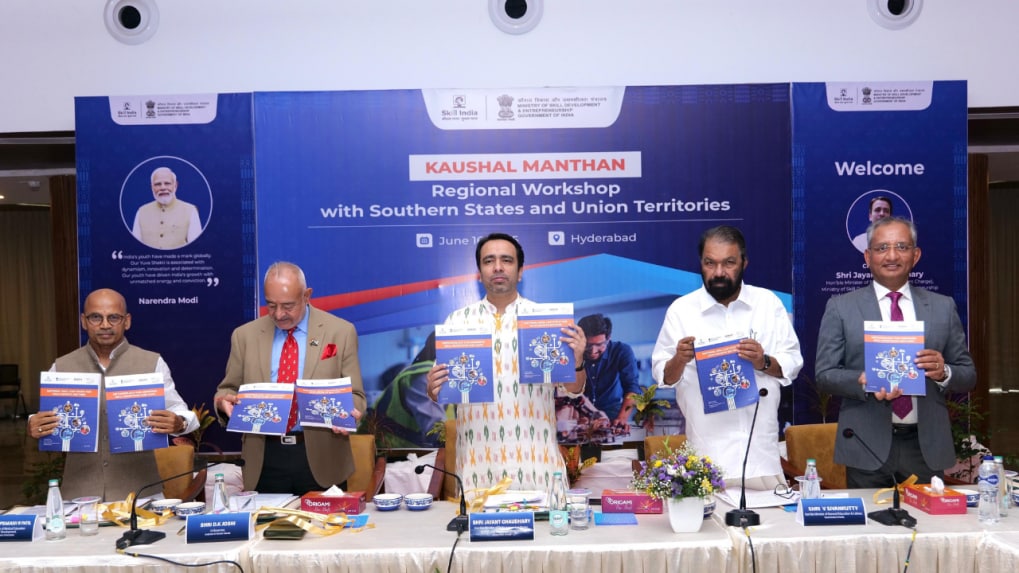Skill development can't have prescriptive templates: adaptive, locally-driven models are the way forward, says Union Minister Jayant Chaudhary
Minister of State (Independent Charge) for Skill Development and Entrepreneurship Jayant Chaudhary, who revealed the establishment of two Centres of Excellence at National Skill Training Institutes in Hyderabad and Chennai—part of a larger plan to roll out five such centres across India.
ADVERTISEMENT
In a bold push towards making India future-ready, the Ministry of Skill Development and Entrepreneurship (MSDE) unveiled a host of strategic initiatives at the Kaushal Manthan Regional Workshop held in Hyderabad, aiming to align local skilling frameworks with national priorities under the Viksit Bharat @2047 vision. The event brought together over 120 key stakeholders, including ministers from southern states and UTs, senior bureaucrats, and sectoral experts, underlining Centre-State collaboration as a cornerstone for outcome-based skilling.
One of the most significant announcements came from Minister of State (Independent Charge) for Skill Development and Entrepreneurship Jayant Chaudhary, who revealed the establishment of two Centres of Excellence at National Skill Training Institutes in Hyderabad and Chennai—part of a larger plan to roll out five such centres across India. These institutes are envisioned to become national anchors for high-quality instructor training and advanced skilling in emerging technologies.
Jayant Chaudhary called for a shift away from rigid, one-size-fits-all approaches in skilling. “Skill development cannot have prescriptive templates,” he said. “We must empower states to craft solutions that are rooted in their local economic contexts and aligned with the aspirations of their youth. Only then can we create meaningful impact and sustained transformation.”
Addressing the critical need for instructional quality, the Minister mandated that all newly recruited instructors in ITIs must hold a CITS (Craft Instructor Training Scheme) certification. To ensure consistent standards across the board, he urged states to revise recruitment rules to align with NCVT norms. “Instructional excellence cannot be compromised. CITS must become non-negotiable across the ecosystem,” Chaudhary stated, pushing for parity in national skilling benchmarks.
Reinforcing the government’s long-term commitment, the Minister emphasized the need for a decentralised, data-driven approach, calling on states to work closely with district collectors and expert bodies like the World Bank to develop localised skilling plans. He also advocated for significant investments in faculty development, competitive remuneration, and structured pedagogical training to build a resilient training infrastructure.
Beyond institutional reforms, the event also spotlighted innovations in grassroots entrepreneurship. During a visit to the Biochar Center of Excellence at Kanha Shanti Vanam, the Minister launched India’s first Rural Entrepreneurship Training Program on Biochar. The initiative aims to skill rural youth across the biochar value chain—right from biomass processing to product marketing—with the goal of setting up decentralized biochar units that could become economically self-sustaining by year two, creating 4–8 seasonal jobs per unit and tapping into carbon credit markets.
Lt. Governor D.K. Joshi (Andaman & Nicobar Islands) highlighted how infrastructure projects like the International Container Transshipment Terminal and Greenfield airports are unlocking skilling potential in logistics, marine services, and tourism.
Dr. Sharanprakash R. Patil (Karnataka) spoke about the state’s international skilling efforts, emphasizing 270 ITIs and placement programs in foreign languages and nursing as part of a global workforce readiness strategy.
V. Sivankutty (Kerala) reiterated Kerala’s focus on quality skilling through institutions like the Kerala Academy for Skills Excellence, supported by national schemes like PMKVY and SANKALP, with a special focus on ports and logistics.
As discussions on ITI upgradation, apprenticeship scaling, digital skilling via the Skill India Digital Hub, and stronger industry partnerships took center stage, the overarching message remained clear: India’s skilling ecosystem is undergoing a strategic transformation—prioritizing quality, accountability, and relevance to prepare youth not just for jobs, but for a dynamic, global economy.

